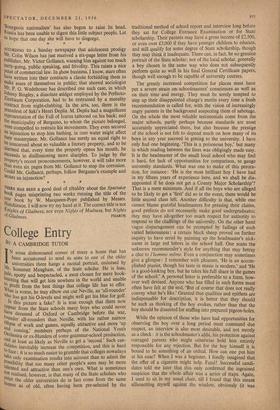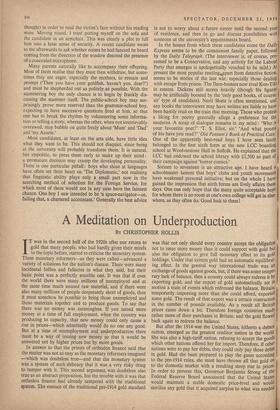College Entry
BY A CAMBRIDGE TUTOR N some dishonoured corner of many a home that has I been accustomed to send its sons to one of the older ,,, universities there hangs a mental portrait, endorsed by 'Ir. Somerset Maugham, of the State scholar. He is lean, fate, spotty and bespectacled, a swot chosen for mere book- earning that will get him nowhere in fhe world and unable what Profit from the best things that college life has to offer. what is worse, he may elbow out our Neville, an 'all-rounder' who has got his 0-levels and might well get his blue for golf. . Is this picture a fake? It is true enough that there now have from the State schools many boys who could never 2`tve dreamed of Oxford or Cambridge before the war, rounder all-rounders than Neville, with his rather narrow and of work and games, equally attractive and more `up r.,"rld coming,' members perhaps of the National Youth -kohestra or ex-Hamlets of some grammar-school production, 1,9 at least as likely as Neville to get a 'second.' Such can- uldales inevitably increase the competition, and this is hard .o t face : it is so much easier to grumble that colleges nowadays lake only examination results into account than to admit the Possibility that too many other people's sons may be more talented and attractive than one's own. What is sometimes l lot realised, however, is that many of the State scholars who enter the older universities do in fact come from the same ,I I °rues as of old, often having been pre-selected by the traditional method of school report and interview long before they sat for College Entrance Examination or for State scholarship. Their parents may have a gross income of £2.500, or even over £3,000 if they have younger children to educate, and still qualify for some degree of State scholarship, though they may think it inadequate. There can, in fact, be no genuine portrait of the State scholar; nor of the local scholar, generally a boy Chosen in the same way who does not subsequently perform quite so well in his final General Certificate papers, though well enough to be capable of university courses.
The greatly increased competition for places must have put a severe strain on schoolmasters' consciences as well as on their time and energy. They must be sorely tempted to step up their disappointed charge's merits every time a fresh recommendation is called for, with the vision of increasingly angry parents in the background suspecting them of sabotage. On the whole the most reliable testimonials come from the major schools, partly perhaps because standards are most accurately appreciated there, but also because the prestige of the school is not felt to depend much on how many of its boys in any year succeed in getting to the university. I have only had one beginning, 'This is a poisonous boy,' but many in which reading between the lines was obligingly made easy. It is the headmaster of the small local school who may find it hard, for lack of opportunities for comparison, to gauge university standards. What was one to make of this perora- tion, for instance : 'He is the most brilliant boy I have had in my fifteen years of experience here, and we shall be dis-. appointed if he does not get a County Major Scholarship'? That is a mere minimum. And if all the boys who are alleged to be likely to get a 'first' did so in the event, there would be little second class left. Another difficulty is that, while one cannot blame grateful headmasters for pressing their claims, good prefects do not necessarily make good undergraduates; they may have altogether too much respect for authority to respond to the challenge of the university. On the other hand vague disparagement can be prompted by failings of such varied heinousness : a certain black sheep proved on further inquiry to have erred by painting up the headmaster's nick- name in large red letters in the school hall. One scans the unknown recommender's style for anything that may betray a clue to l'honnne memo. Even a conjunction may sometimes give a glimpse : I remember with pleasure, 'He is an accom- plished pianist, though his taste in music is modern.' and 'He is a good-looking boy, but he takes his, full share in the games of the school.' A personal letter is preferable to a form, how- ever well devised. Anyone who has filled in such forms must often have felt at the end, 'But of course that does not really convey what he's like.' Granted that qualities and epithets are indispensable for description, it is better that they should be such as thinking of the boy evokes, rather than that the boy should be dissected for stuffing into prepared pigeon-holes.
While the opinion of those who have had opportunities for observing the boy over a long period must command due respect, an interview is also most desirable, and not merely as a check : it is the schoolmaster's alibi, his protection against outraged parents who might otherwise hold him entirely responsible for any rejection. But for the boy himself it is bound to be something of an ordeal. How can one put him at his ease? When I was a beginner, I fondly imagined that the offer of a cigarette might help. Fatal! Successful candi- dates told me later that this only confirmed the ingrained suspicion that the whole affair was a series of traps. Again, I used to sit in my usual chair, till I found that this meant silhouetting myself against the window, obviously (it was thought) in order to read the victim's face without his reading mine. Moving round, 1. tried putting myself on the sofa and the candidate in an armchair. This was clearly a plot to lull him into a false sense of security. A recent candidate wrote to me afterwards to ask whether noises he had fancied he heard coming from the direction of the window denoted the presence of a concealed microphone.
Many parents naturally like to accompany their offspring. Most of them realise that they must then withdraw, but some- times they are eager, especially the mothers, to remain and prompt ('Then you have your goldfish, haven't you, dear?') and must be shepherded out as politely as possible. With the stammering boy the only chance is to begin by frankly dis- cussing the stammer itself. The public-school boy may sur- prisingly prove more reserved than the grammar-school boy, expecting to have successive questions fired at him, so that one has to break the rhythm by volunteering some informa- tion or telling a story; whereas the other, when not irretrievably overawed. may bubble on quite freely about `Mum' and 'Dad' and 'my Auntie.'
Most candidates, at least on the arts side, have little idea what they want to be. This should not disquiet, since being at the university will probably transform them. It is natural, but impolitic, to press them early to make up their mind : a premature decision may cramp the developing personality. There is one particular pitfall: boys who shine at languages have often set their heart on 'The Diplomatic,' not realising that linguistic ability plays only a small part now in the searching method of selection for the Foreign Service, for which most of them would not in any case have the faintest chance. One boy I saw intended to be 'a space-navigator—or, failing that, a chartered accountant.' Generally the best advice
is not to worry about a future career until the second year of residence, and then to go and discuss possibilities with someone at the university's appointments board.
In the homes from which these candidates come the Daily Express seems to be the commonest family paper, followed by the Daily Telegraph. (The interviewer is, of course, pre• sumed to be a Conservative, and any activity for the Labour Party that emerges is apologetically vouched to be mild.) At present the most popular reading,kapart from detective fiction, seems to be stories of the late war, especially those dealing with escape from prison. The Dam-busters now rival Kon-Tild in esteem. Dickens still scores heavily (though his figures may be artificially boosted by the 'only good books, of course, sir' type of candidate). Nevil Shute is often mentioned, and any books the interviewer may have written are liable to have been hastily read on the train that morning. Those who profess a liking for poetry generally allege a preference for the moderns. A scrap of dialogue remains in my mind : 'Who is your favourite poet?"T. S. Eliot, sir.' And what poems of his have you read?' 'Old Possum's Book of Practical Cats.' One of the apparently best-read boys I have seen lately belonged to the first sixth form at the new LCC boarding school at Woolverstone Hall in Suffolk. He explained that the LCC had endowed the school library with £1,500 as part of
their campaign against 'horror comics.' , Sixteen to seventeen is an attractive age. I have heard schoolmaster lament that boys' clubs and youth movements have weakened personal initiative; but on the whole I have gained the impression that sixth forms are lively affairs these days. One can only hope that the many quite acceptable boys for whom there is no room at one's own college will get in else/ where, as they often do. Good luck tO them I



































 Previous page
Previous page